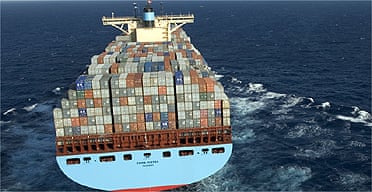Christmas is coming not in sacks or sleighs this year but on board the biggest ship afloat, on its maiden voyage from China. To the relief of children, parents and shopkeepers everywhere - but to the despair of European manufacturers - mountains of crackers, toys and games as well as decorations, calendars, wrapping paper, food and every imaginable gift are currently steaming past Spain and should reach Felixstowe, Suffolk, on Saturday aboard the vast Emma Maersk 3.
If anything - perish the thought - should happen to this quarter of a mile long, 200ft-high (61 metre) behemoth, that is as wide as a motorway and is powered by the largest diesel engine ever built, then Christmas might have to be cancelled. The manifest for the 3,000 containers of goods that it will drop off in Britain on its way to mainland Europe reveals the largest single consignment of festive cheer ever delivered - a floating world of British desires and necessities.
For children, the ship is like Hamleys, Harrods and Selfridges combined. If the contents of the ship are anything to go by, this year electronic dinosaurs and dancing gorillas are clearly going to be big, as are radio-controlled cars and motorbikes, electric guitars and drumsticks, soft toys, pinball machines, computers and MP3 players. One British importer alone is bringing in 17 40ft containers full only of sudoku games, nursery rhyme books, jigsaws and soft toys.
But the Emma Maersk, which has a crew of just 13 and a propeller weighing 130 tonnes, is also witness to how global manufacturing has shifted massively from Europe and the US to China as free trade has burgeoned under the auspices of the World Trade Organisation.
While the boat is carrying around 11,000 containers and is by far the largest container ship ever built, Yentian port, where it set off from for Europe last month, now exports nearly three times that many containers every day. China is now far and away the world's biggest maker and exporter of everything from toy gorillas to steel and electronic goods.
The manifest of the ship perfectly reflects the consumer society at Christmas. Crackers, poker tables, bingo sets, drum kits, electronic toys and pre-school building blocks by the score will be delivered in astonishing quantities: 1,886,000 Christmas decorations are loaded in one container, 40,000 rechargeable batteries and 22,280 kg of Vietnam tea in another. In another are 12,800 MP3 players.
The British Christmas table would barely groan without the Emma Maersk. The thousands of container-loads that the Guardian has seen show thousands of frozen chickens, 150 tonnes of New Zealand lamb, pumpkins, 10 tonnes of mussels, along with unspecified quantifies of swordfish, tuna, noodles, biscuits, jams and "lunch boxes".
There are potato mashers, slotted spoons and graters to cook with, toothpicks, leather sofas to recline on, new spectacles to watch new televisions by, and pyjamas to go to bed in. Pets will be especially pleased; 138,000 tins of catfood - variety unknown - are on their way, as are mountains of dogfood.
One-way traffic
One woman who will not be at Felixstowe watching the Emma Maersk arrive in the Orwell estuary with the aid of several tugs and two pilots is Caroline Lucas, Green MEP for south-east England. Last year she led an EU study into trade with China and found its implications terrifying.
Trade between China and Britain is very much one-way traffic. According to the Department of Trade and Industry, Britain exported just over £2.8bn of goods to China last year but imported nearly £16bn - a 30-fold increase on 1980. The UK may be Europe's third biggest trading partner with China but in global terms we account for less than 2% of China's trade. Warning that more than a million jobs in European agriculture and textiles could be lost within a year, Ms Lucas said the Emma Maersk was a microcosm of globalisation.
"These are the goods that Europe used to make. We are faced with a country that has an almost absolute advantage in an increasing number of sectors. This a triumph for multinational capital, not for Chinese workers who, as well as suffering from some of the worst labour exploitation on record, are also losing jobs at a phenomenal rate," she said.
"Whole sectors of global trade are now being dominated by companies operating out of China and it's clear that the whole free trade project is in question. The real cost of the goods that the Emma Maersk is bringing in should include the environment, the markets destroyed in developing countries and the millions of jobs lost."
But Europe's trade commissioner, Peter Mandelson, who could not be contacted yesterday, would almost certainly approve of the Emma Maersk. The official line from his Brussels office is that China is a globalisation "success story" and its growth as a manufacturing centre means cheaper goods in European shops, more competitive companies, and lower inflation.
Vicious circle
But the commission is under constant pressure from shoemakers and others to stop the dumping of cheap Chinese and Vietnamese goods, and last year in the "bra wars" it briefly banned the import of Chinese textiles.
"We want China to trade fairly and to observe the intellectual property rights of European companies," said an EU spokesman.
The Emma Maersk, the first of a fleet of seven equally large container ships, will soon be on its way back to China. But instead of carrying toys and electronic gorillas, catfood and computers, it will be taking back the detritus of a throwaway Christmas.
In what has been described as both a virtuous and a vicious circle, one of Britain's biggest exports to China is now waste plastic - which is turned back into the soft toys and decorations that the Emma Maersk brings to Britain.
